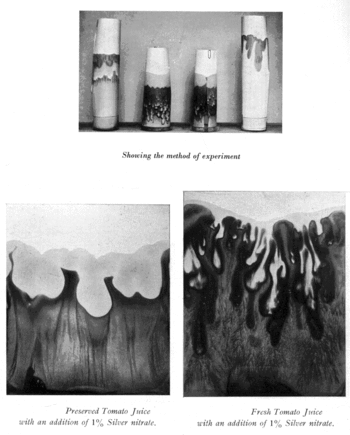Capillary dynamolysis: Difference between revisions
(Created page with "thumb|350px|Capillary dynamolysis according to Lili Kolisko. '''Capillary dynamolysis''' ({{German|a:Steigbildmethode|Steigbild...") |
No edit summary |
||
| Line 1: | Line 1: | ||
[[File:Kolisko_capillary_dynamolysis_1.gif|thumb|350px|Capillary dynamolysis according to Lili Kolisko.]] | [[File:Kolisko_capillary_dynamolysis_1.gif|thumb|350px|Capillary dynamolysis according to Lili Kolisko.]] | ||
'''Capillary dynamolysis''' ({{German|[[a:Steigbildmethode|Steigbildmethode]]}} "rising picture method") was developed by [[Lili Kolisko|Lili Kolisko]] and is one of the image | '''Capillary dynamolysis''' ({{German|[[a:Steigbildmethode|Steigbildmethode]]}} "rising picture method") was developed by [[Lili Kolisko|Lili Kolisko]] and is one of the [[image forming method]]s by which the "vital quality" of food and other substances can be assessed. The method was further developed by [[a:Wala|Wala Heilmittel GmbH]] under the direction of [[a:Rudolf Hauschka|Rudolf Hauschka]]. | ||
A variant of this method, in which the solution to be examined spreads out horizontally rather than vertically, is the [[round filter method]] developed by [[Ehrenfried Pfeiffer]]. | A variant of this method, in which the solution to be examined spreads out horizontally rather than vertically, is the [[round filter method]] developed by [[Ehrenfried Pfeiffer]]. | ||
Latest revision as of 13:41, 2 August 2021

Capillary dynamolysis (German: Steigbildmethode "rising picture method") was developed by Lili Kolisko and is one of the image forming methods by which the "vital quality" of food and other substances can be assessed. The method was further developed by Wala Heilmittel GmbH under the direction of Rudolf Hauschka.
A variant of this method, in which the solution to be examined spreads out horizontally rather than vertically, is the round filter method developed by Ehrenfried Pfeiffer.
Method (WALA)
In the first rising phase, 0.6 ml of an aqueous extract of the test sample, either pure or diluted to 50% with distilled water, is made to rise on a chromatography paper without the presence of an electric field. In the second rising phase, the silver rising phase, after an intermediate drying time of about 2 to 3 hours, 0.7 ml of 0.25% silver nitrate solution is allowed to rise so that it exceeds the so-called juice rising front by just under 1 cm. This results in a characteristic drop-like fringe on the first uniform riser front. The riser fronts of the first and second riser phase often remain recognisable as a horizontal line in the finished image. After another drying time of approx. 2 hours, the third rising phase, the iron rising phase, follows with 2 ml of 0.25% iron sulphate solution up to a total rising height of approx. twelve centimetres. The temperature is kept constant at 20°C during this time. The humidity should initially be 50 % rel. humidity and is increased during the 2nd and 3rd climbing phase.
After the subsequent drying process, a sample is found on the paper by whose morphological nature the quality of the sample can be assessed.
Literature
- Magda Engqvist: Die Steigbildmethode. Ein Indikator für Lebensprozesse in der Pflanze., Vittorio Klostermann, Frankfurt am Main 1977
Weblinks
- Capillary Dynamolysis - Article by Adam McLean.
- Capillary Dynamolysis - Article by David J. Heaf.
- Aneta Zalecka, Entwicklung und Validierung der Steigbildmethode zur Differenzierung von ausgewählten Lebensmitteln aus verschiedenen Anbausystemen und Verarbeitungsprozessen. Dissertation, Universität Kassel 2007
